|
The Green Deal addresses the following priorities: clean energy supply; and increasing the value given to protecting and restoring the of natural environment, to sustainable use of resources and to improving human health. Many different policy instruments – from hard regulation to coordination mechanisms and economic incentives – will be put in place to build the overall framework and in each respective policy areas.
The EU Green Deal lays down EU growth policy framework to be adopted in the next five years. It aims at building a decoupled economy from the use of natural resources, and without net emissions of greenhouse gasses in 2050. This strategy is presented in the Communication published by the European Commission on 11 December. If needed, the Commission will further update the Green Deal after adoption and implementation of the first policy responses. Some challenges may be addressed at EU level, while others require global coordination and participation – e.g. loss of biodiversity. It will be crucial to include and engage the financial sector to achieve the desired transformation of EU economy and society. Overall, EU policy responses require intense coordination and a holistic approach. As part of the Green Deal, the European Semester – the macro-economic coordination mechanism of the EU – will integrate the sustainable development goals (SDGs).
The European Commission will propose the first ‘European Climate Law’ no later than March 2020. This will enshrine the 2050 climate neutrality objective in legislation. By June 2021, the Commission will also review and propose to revise all relevant climate-related policy instruments in order to ensure fair and effective carbon pricing throughout the economy. This new framework that will be adopted in the next five years should promote more sustainable economy and society.
EU model for separate waste collection
Waste sector will undergo crucial transformation and innovation along with all other relevant sectors of EU economy. The legislative framework has been just revised. Implementation is calling. 65 % of waste must be recycled by 2035 and separate collection, says the Commission in the Green Deal, simplifies waste management for citizens and ensure cleaner secondary raw materials for businesses. The Commission will therefore propose an EU model for separate waste collection.
In March 2020, the Commission will adopt a new circular economy action plan. A key aim of the new policy framework will be to stimulate the development of markets for circular products and secondary raw materials. The action plan will also include a regulatory framework for biodegradable and bio-based plastics.
The Common Agricultural Policy should lead to use of sustainable practices, such as precision agriculture, organic farming, agro-ecology and agro-forestry. Farmers should be rewarded and incentivized to improve nutrient management and restore soil organic matter. In spring 2020, the Commission will present the Farm to Fork strategy and launch a broad stakeholder debate paving the way to formulating a more sustainable food policy. EU’s environmental agenda for the next five years include also a biodiversity strategy to be presented in March 2020, and, in 2021, a Zero Pollution action plan for air, water and soil.
For the full list of initiatives, download the annex to the Commissions's communication.
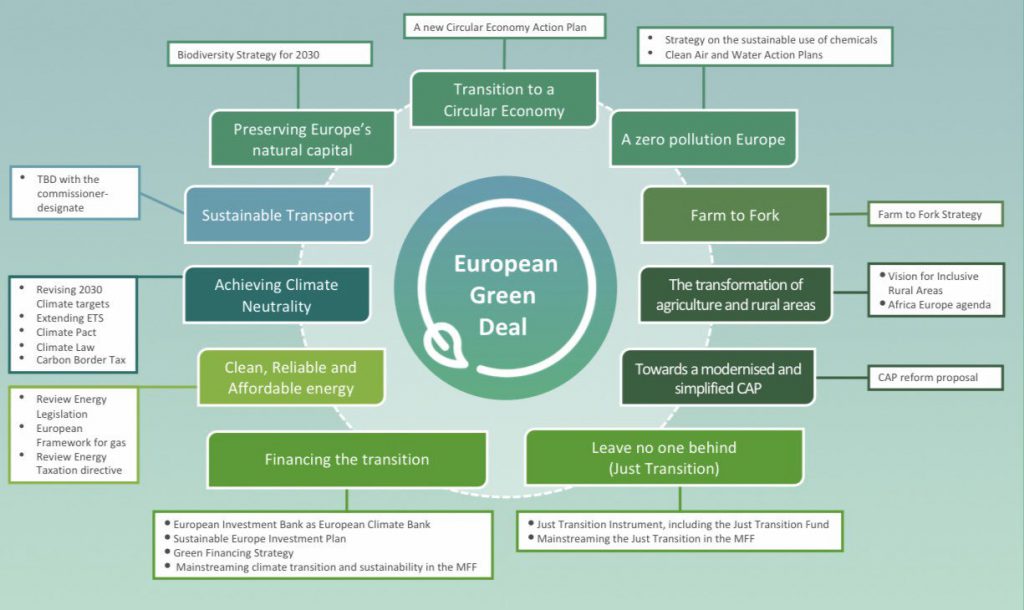

DG ENV Conference, 25 November 2019
Soil and Sustainable development Goals: Challenges and the Need for Action
The Sustainable Development Goals (SGDs) were launched by the United Nations in 2015 and aim to provide a blueprint for peace and prosperity for people and the planet.
In total, there are 17 Goals, covering a range of social and environmental indicators, such as sustainable cities and communities (Goal 11), and life on land (Goal 15). Set within goal 15, is the indicator 15.3, which aims to combat desertification and restore degraded land and soil. This was the focus of a meeting organised by the Soils Unit of the European Commission held in November in Brussels. Delegates from both the public and private sectors heard from a range of speakers about the need for action and the urgency of the situation.
Further information about the conference, including copies of the speakers’ presentations and a draft report on ‘Providing support in relation to the implementation of soil and land related Sustainable Development Goals at EU level’ can be accessed here.
The full article can be accessed here.
The recently published State of the Environment Report 2020 by the EEA can be accessed here.
ECN presents European Commission with S.O.S Manifesto
Stefanie Siebert, ECN’s Executive Director, presented Claudia Olazabal (Head of Soils Unit, DG Environment) with a manifesto signed by key stakeholders. A joint initiative between ECN and the Italian Composting and Anaerobic Digestion organisation, CIC, sets out why Europe’s soils needs protection and highlights the lack of an EU-wide policy tool. It calls on policy makers to develop instruments to move Europe towards implementing sustainable, climate-proof land management practices.
Stefanie also presented Claudia with a copy of ECN’s flagship status report ‘European Bio-waste Management’.
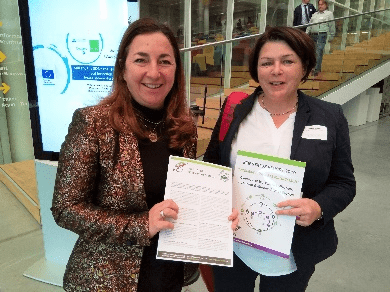
L-R: Claudia Olazabal and Stefanie Siebert

S.O.S Initiative
LIPOR signed the Manifesto on Save Organics in Soil
At the last ECN Board meeting on 12 December, LIPOR’s president Fernando Leite signed S.O.S initiative Save Organics in Soil’. So far, more than 50 organisations have signed the manifesto. The main priority goals are to encourage policy makers to develop instruments to move Europe towards implementing sustainable, climate-proof land management practices.
The urgency for the wider land use sectors to increase efforts to address climate mitigation and adaptation has increased since the signing and ratification of the Paris Agreement, with its ambitious targets. Therefore, the fresh challenge for policy makers is to develop instruments to better balance private and societal interests while swiftly moving towards sustainable, climate-proof land management practices, according to few priorities, such as:
- Protecting the existing carbon stock of carbon rich soils. It is a priority to ensure the protection of remaining carbon rich soils where they occur in Europe, both through preventing the ploughing of those soils already under permanent grassland and minimizing further losses of carbon from cultivated carbon rich soils;
- Maintaining soil organic matter by respecting the biological cycle. Therefore, adding stabilised organic matter from the biological treatment of sustainable biomass (e.g. bio-waste) should be promoted;
- Minimising losses of, and increasing, soil organic matter on all soils;
- Encouraging the use of recycled nutrients and the more efficient management of nutrients on agricultural land. This would not only benefit the climate but also be particularly beneficial to improve water and air quality.
Please sign now!
ECN will further collect signatories to urge the Commission and the Member States to take actions on soil protection and measures to maintain and increase soil organic matter. With the new EU Green Deal and the Sustainable Goals the frame is set: the Farm to Fork strategy, the CAP 2020 reform, the Biodiversity strategy and the Green Financing Strategy are essential policy measures for achieving the climate goals.
The Manifesto 'Save Organics in Soils' can be signed online here.
More information on the S.O.S. Initiative is available here.

ECN Factsheet
Sustainable Use of Compost and Digestate to improve Soil Organic Matter
Companying the S.O.S. Soil initiative ECN has published an overall factsheet on the ’Sustainable use of compost and digestate to improve soil organic matter’.
The organic matter content of most of Europe’s arable soils is decreasing. This has important implications, as these soils:
- Are less productive – that is, they grow fewer crops;
- Hold onto less water – this means that they dry out quicker in the summer months when water is scarce, and are not as good at absorbing water when it does rain, therefore increasing the likelihood of flooding;
- Store less carbon – this is because soil organic matter is mostly carbon, and it can stay in the soil for many decades if not centuries.
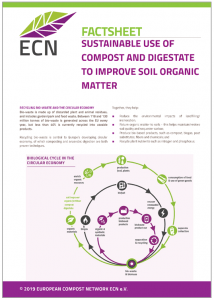 Sustainable and productive agriculture is therefore dependent upon both adequate levels of soil organic matter and the supply of plant nutrients. Adding compost to soil therefore increases a soil’s organic matter content, and this has been shown in numerous long-term trials. It is also thought that once applied to soil, the organic matter fraction is further transformed by soil microbes into more stable forms, meaning that it stays in the soil for longer. Sustainable and productive agriculture is therefore dependent upon both adequate levels of soil organic matter and the supply of plant nutrients. Adding compost to soil therefore increases a soil’s organic matter content, and this has been shown in numerous long-term trials. It is also thought that once applied to soil, the organic matter fraction is further transformed by soil microbes into more stable forms, meaning that it stays in the soil for longer.
The factsheet ’Sustainable use of compost and digestate to improve soil organic matter’ can be accessed here .

Announcements
Soil loves compost
The annual week of compost awareness (ICAW) raising has been embraced by compost organisations across the world, including ECN.
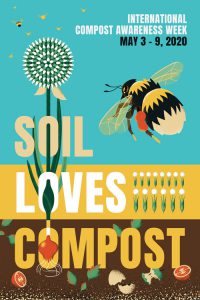 Next year’s theme ‘Soil loves Compost' is scheduled for the 3-9 May, and plans are already underway to promote the initiative. Next year’s theme ‘Soil loves Compost' is scheduled for the 3-9 May, and plans are already underway to promote the initiative.
Soil loves compost because compost feeds soil! Soil is alive and needs nourishment to be healthy. With healthy soil you grow healthy plants. Soil Loves Compost because it provides food and nutrients for living microbes that make up healthy soil. Without compost we would have few ways to enrich and restore soil. Compost keeps soil strong and healthy by reusing and recycling organic materials in a “zero waste” cycle. Compost keeps our soil happy and it keeps our planet healthy.
Get involved!
If you plan any activities during ICAW from 3-9 May, please let us know! We will announce your project in the ECN network.
More information on ICAW is available here.

Call for Papers
RAMIRAN 14-17 September 2020 (UK)
The 18th International RAMIRAN conference to be held in the historic University city of Cambridge, UK is a research and expertise network set up over 25 years ago to improve nutrient utilisation and minimise the environmental impact from livestock manure and other organic material use in agricultural systems.
The conference will include sessions on -
- Policy and regulation - Prof Wilfried Winiwarter (IIASA)
- Nutrient utilisation - Prof Lin Ma (Chinese Academy of Sciences)
- Soil quality -Dr Anne Bhogal (ADAS)
- Air and water quality - Dr Karl Richards (Teagasc)
- Treatment and processing technologies - Dr Oscar Schoumans (Wageningen)
- Promoting best practice - Caroline Drummond (LEAF)
Registration and abstract submission are open and the website www.ramiran2020.org will be updated to provide more information on the conference.

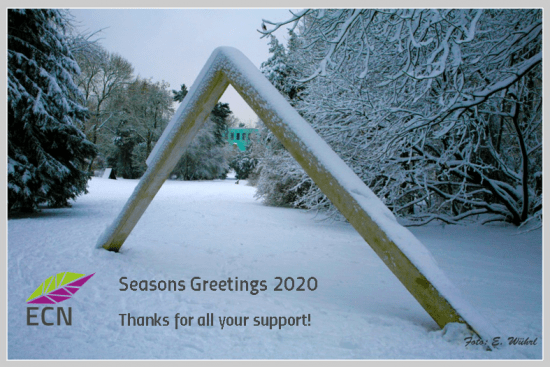
|